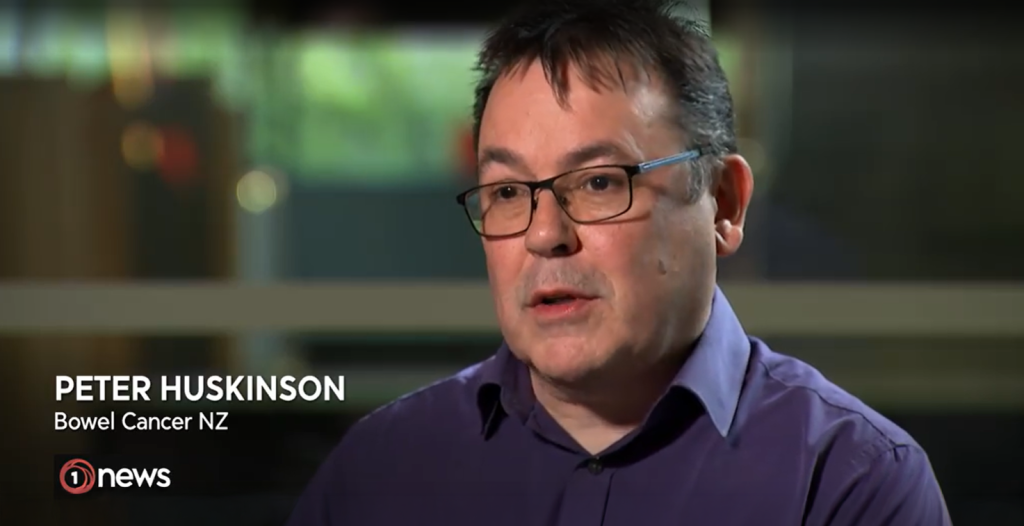Bowel Cancer New Zealand Chief Executive Peter Huskinson spoke to 1News about the announcement – watch the interview here.
Bowel Cancer New Zealand (BCNZ) has welcomed the Government’s announcement that bowel screening will now be available from age 58, alongside the rollout of a new nationwide FIT for Symptomatic testing pathway – but says further action is needed to catch bowel cancer earlier and save more lives.
Bowel cancer is New Zealand’s second-deadliest cancer, claiming 1,200 lives every year – around 100 every month – despite being 90 percent treatable if caught early.
BCNZ Chief Executive Peter Huskinson says the announcement represents the first building blocks of meaningful progress, but more urgency is needed to match Australia and keep pace with rising early-onset bowel cancer.
“This is a welcome start, but we’ve clearly got to go way further if we’re going to keep pace,” says Huskinson.
“With the rising tide of early-onset bowel cancer, New Zealand is now the fastest-growing early-onset bowel cancer country in the world. This is affecting people in their 30s and 40s in particular – and we have to screen from 45.”
“The key is for the Government to commit to a date to complete the job of getting screening at 45. That way, the health system can plan for it. Until there is a firm target it remains an aspiration without a plan.”
The new FIT for Symptomatic test is a free, at-home faecal immunochemical test that checks for microscopic traces of blood in a small stool sample – a potential early sign of bowel cancer. It allows anyone of any age who presents with bowel symptoms to quickly assess their risk without having to wait for a colonoscopy.
Findings from a pilot study in two districts of New Zealand showed the FIT test to be highly effective in helping rule out bowel cancer in people with symptoms. It provides faster reassurance for most patients and ensures those at higher risk are prioritised for colonoscopy. The pathway is already operating in Waikato, with rollout to Counties Manukau, Waitematā and Hawke’s Bay from October, and nationwide expansion expected in 2026, as confirmed by the Health Minister.
The FIT for Symptomatic pathway is also expected to reduce colonoscopy demand by up to 60 percent – creating the headroom needed to safely expand screening to younger New Zealanders.
Professor Frank Frizelle, colorectal surgeon and BCNZ medical advisor, says rising rates of bowel cancer among younger New Zealanders highlight why screening must start earlier.
“We’re seeing bowel cancer increase by around 26 percent every decade in people under 50 – and even faster among Māori, at around 35 percent. Screening younger is the best way to address that trend.”
Nearly a third of bowel cancer patients under 75 develop bowel cancer before they reach the current screening age, and for Māori it’s about half.
Huskinson says the combination of the FIT for Symptomatic rollout and the screening-age reduction gives the Government a strong platform to build on – and insists that equity must remain central to implementation.
“The systems are improving – now we need the urgency to match,” says Huskinson.
“With colonoscopy capacity increasing and FIT testing now freeing up specialists, there’s no reason to delay. If we lower the screening age to 45 and ensure earlier access for Māori and Pacific peoples, modelling shows we could catch up to 93 percent of cases before they develop. That’s a once-in-a-generation opportunity to save hundreds of lives.”
BCNZ is also calling for robust “safety-net” systems to ensure anyone whose symptoms persist after a negative test is re-assessed, and for outcomes data to be published to confirm Māori and Pacific peoples are benefiting equally from the change.
BCNZ says it looks forward to working with the Ministry of Health, Te Whatu Ora and the Minister to build capacity and ensure everyone in Aotearoa has timely, equitable access to lifesaving screening and diagnosis.

